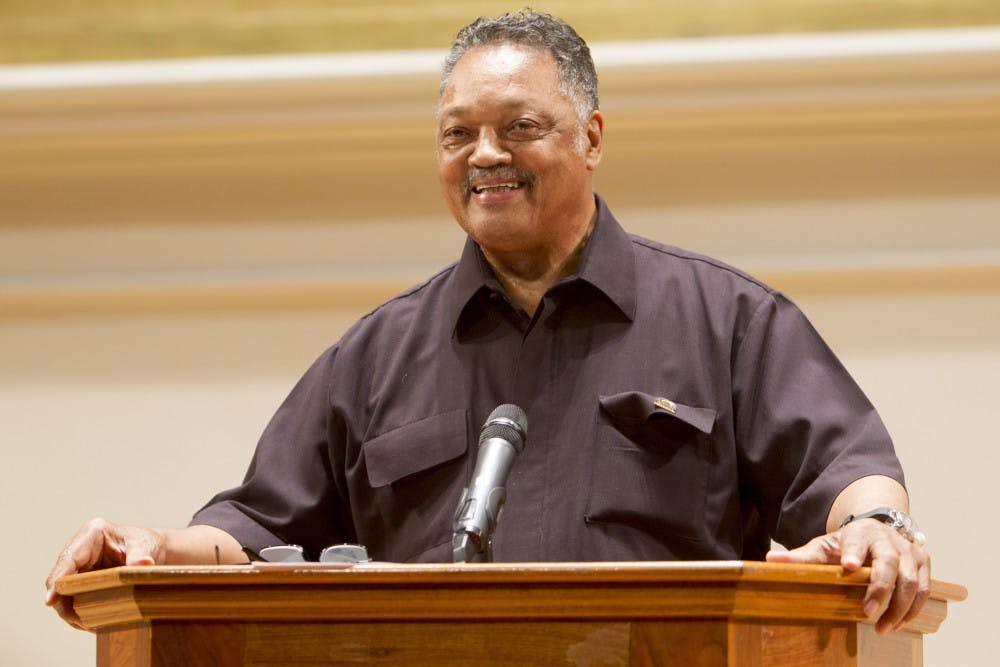Over 100 students, faculty and community members gathered inside Old Cabell Hall Thursday afternoon to hear Rev. Jesse Jackson speak. Jackson addressed the violent, hate-based events of Aug. 11 and 12 and offered a message of healing and rebuilding. He also focused a portion of the address to the need for automatic voter registration.
The event, which marked the start of Jackson’s Voter Registration Tour, was co-sponsored by the Lambda Zeta chapter of Omega Psi Phi Fraternity, Inc. and the The Luther Porter Jackson Black Cultural Center Student Funding Committee.
Jackson is one of the nation’s foremost civil rights, political and religious leaders and the founder of the Rainbow PUSH Coalition — a multi-racial, multi-issue, international non-profit organization focused on achieving and protecting civil rights.
Gary Flowers, an alumnus of the Lambda Zeta chapter of Omega Psi Phi, is an advisor with Jackson through the PUSH Coalition, Miles Braxton, fourth-year College student and Basileus of the Lambda Zeta chapter of Omega Psi Phi told The Cavalier Daily.
“Jesse Jackson, in light of the Aug. 11 and 12 events, wanted to kick off his automatic voter registration bus tour here in Charlottesville,” Braxton said. “So we were really appreciative of that.”
At the end of his speech, Jackson invited anyone in the audience who was not registered to vote in Charlottesville to go to the stage and register. Virginia is one of two states, alongside New Jersey, hosting a gubernatorial race this November.
“If you’re not registered to vote in Charlottesville, please stand … come on down, I’m going to register you all today,” Jackson said.
Braxton considered the event a success regarding the messages conveyed and the voter registration accomplished.
“We signed 70 people up to register to vote so that was an accomplishment within itself there,” Braxton said. “I’m really, really proud of what the event accomplished and hopefully we can bring something even bigger next time.”
The first part of the event focused on the events of Aug. 11 and 12 and healing and rebuilding as well as addressing inequality, discrimination and division in America, both past and present. Jackson began his address to the crowd with a call-and-response recitation of an oath he is famous for repeating.
“Say I am. I am somebody … Respect me, protect me, never neglect me,” Jackson said. “My mind is a pearl, I can learn anything in the world if my mind can conceive it, then my heart can believe it. I know I can achieve it.”
Jackson conveyed dismay at how public statements responded to the the white nationalist rallies in Charlottesville on Aug. 11 and 12. Jackson said equating the death and struggle of Heather Heyer with the actions of Klansmen and white supremacists makes his heart heavy.
“The Klan would be bold enough to take their hoods off. Neo-Nazis marched in glee. White supremacists bragging about the supremacy of their race,” Jackson said.
Jackson also reflected on years of discrimination of black people in America and the fight for civil rights from the arrest of Rosa Parks to the contentious integration of Little Rock High School.
“We’ve learned to survive apart, now we must learn to live together,” Jackson said.
He paralleled racial divides in American society with building a wall between people. Behind the wall is fear, ignorance, hatred and violence, he said.
According to Jackson, the history of segregation in America is also like planting two seeds of equal strength in the ground and watering them both but building a wall between them. One grows tall and strong, the other is limited and stunted.
“That does not mean the smaller is lesser or the taller is better, it means that one had sunshine … and was able to grow,” Jackson said. “For so long people of color lived in the shadows without access to sunshine.”
Jackson then defined the problem of race in America today as not a fight between black and white but a fight between slavery and freedom.
“Slavery was more than just blacks, slavery was women couldn’t vote,” Jackson said. “Slavery was indentured European servitude. Slavery was the … act to bar Asians. The … act to put Japanese in internment camps.”
In discussing slavery, Jackson addressed the controversial idolization of Confederate generals, such as Robert E. Lee, who fought to preserve slavery during the Civil War. He also acknowledged the conflict over Thomas Jefferson and his direct relationship with slavery yet authorship of the Declaration of Independence.
“[Jefferson] was struggling with how to get out of the slavery system. Lee struggled to maintain it. That’s the distinction between Jefferson and Lee,” Jackson said.
Jackson spoke in support of the removal of confederate statues, arguing they never should have been erected in the first place and comparing symbols of the confederacy to those of the Nazi Party in Germany.
“They have no Hitler statues in Germany. They have no swastikas flying on poles,” Jackson said.
Jackson then focused on the issue of voter registration, emphasizing its significance.
“You are the beneficiaries of the models of the past,” Jackson said. “You must register today. The price we paid to vote — marched too much, bled too much, died too young to give up now. So the burden is on us.”
Toward the end of his speech, Jackson engaged in another call-and-response leaving the audience with a message of unity transcending race.
“Red and yellow, brown, black and white, we’re all precious in God’s eye, everybody matters,” Jackson said. “The only justification I have for looking down on someone is to stop and pick them up.”







